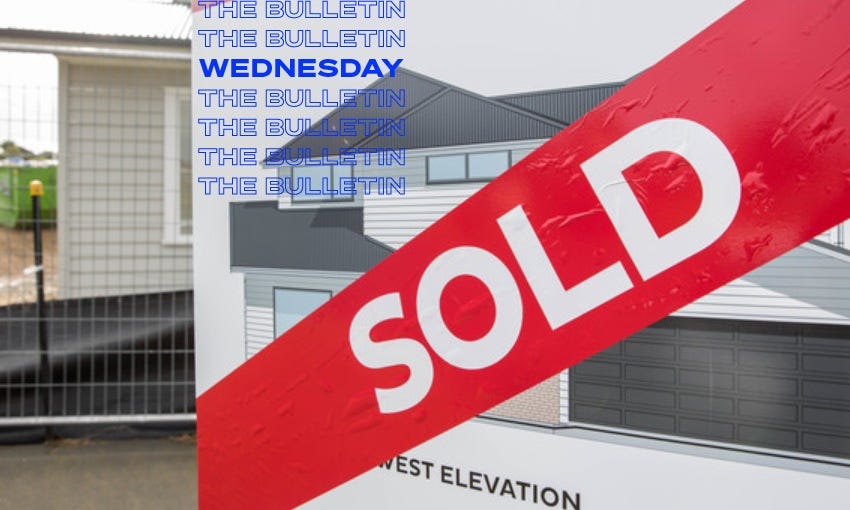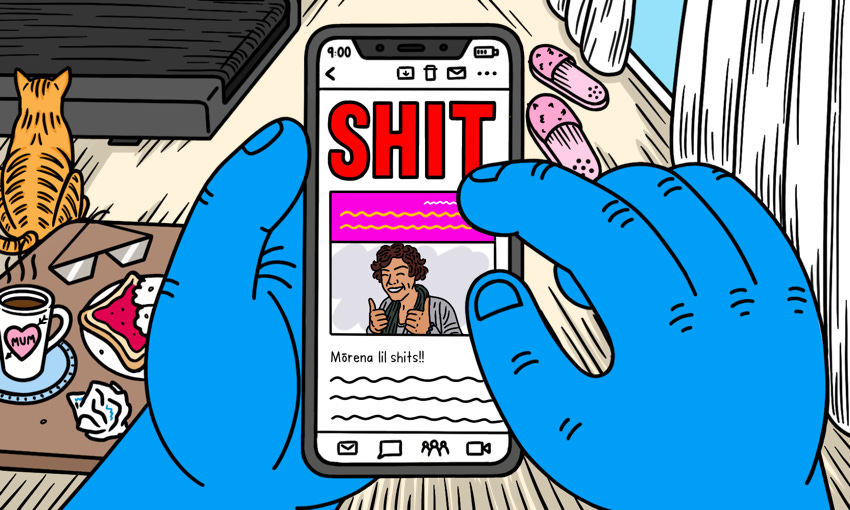An unprecedented boom in housing consents
After seven record-breaking months of consents, New Zealand’s construction sector faces a big house building programme
Mōrena and welcome to The Bulletin for Wednesday, November 3, by Justin Giovannetti. Presented in partnership with Z Energy.
In today’s edition: All Black’s icon sues after dementia diagnosis; snap lockdown in Northland; NZ joins global methane pact; but first, rising consents could end the housing shortage.
The average house price rose to $970,174 last month. (Claire Eastham-Farrelly/RNZ)
Housing consents in New Zealand continue to hit new records. The number of new homes consented hit a record 41,000 in March earlier this year, surpassing the previous peak set in 1974. And then something largely unnoticed but extraordinary happened. In the seven months since March, the number of new consents has continued to soar. Yesterday, consents hit a record 47,331 homes over the year to September according to StatsNZ. It’s a 25% increase in a year, outpacing the price increase over the same period and marking a sustained shift in the country’s housing sector as councils and homeowners have shown an appetite to build.
Really, this is good news. Another way to look at the data is by 1,000 residents. The country has grown tremendously since the great construction boom of the 1970s, so it puts the current figures in perspective. As of last month, 9.3 homes were consented per 1,000 residents. While not a record on that basis, the last time consents were that high was May 1977, when former prime minister Rob Muldoon was still in his first term. In July 2011, only 3 homes were consented per 1,000 people. A record low.
In Auckland, the number of homes consented rose almost 30% since last September, while multi-unit homes like flats and townhouses now make up more than half of new builds in that city and Wellington. With the construction industry facing staff and material shortages, whether those consents can be turned into built houses over the coming years remains a big question mark.
Record consents come while the Reserve Bank warns again, more loudly this time, that house prices are unsustainable. The bank’s governor, Adrian Orr, issued a fresh warning yesterday that house prices pose a threat to the country’s financial stability. According to Stuff, he added that nearly half of the country’s wealth is tied up in the housing market and that’s not a good idea. While the government has looked to Orr to try to lower prices, he once again suggested that the bank’s lowering of interest rates was only a small part of the rise. New Zealand’s mortgage rates are actually high by international levels, according to Orr, so something more fundamental than just cheap borrowing was responsible for the collapse of affordability over the past year.
Will prices come down, in my lifetime? The reserve bank is releasing a financial stability report later today that’s likely to reflect the governor’s warnings. As Interest reports, the bank has said that house prices were high but sustainable through to 2020. Then they soared. With interest rates going up and supply increasing rapidly, “prices are likely to come under pressure to realign with fundamental values.” In a thinly veiled explanation of what that means, the governor described a number of occasions when housing prices fell sharply around the world over the past 50 years.
(Image by Sophie Tse)
A note from The Spinoff publisher Duncan Greive: A year ago, The Spinoff recruited the vastly overqualified Lucy Blakiston to run our instagram. Her own Instagram, Shit You Should Care About, was already a sensation, with millions of fans around Aotearoa and across the globe. It was popular because she delivers world news and pop culture in a funny and approachable style. Now she runs Shit You Should Care About full-time out of The Spinoff offices and collaborates with us on multiple projects.
Why am I telling you this? Because Lucy recently launched her own super-fun daily email, which delivers the full SYSCA internet culture package to your inbox about the same time as The Bulletin. To try it out, sign up here.
A former All Black’s icon has dementia and is suing World Rugby. After years of headaches, déjà vu and memory loss, Carl Hayman has been diagnosed with probable chronic traumatic encephalopathy, or CTE. While there’s been years of discussion about links between CTE and the American NFL, Hayman’s condition puts the spotlight on rugby. Dylan Cleaver spoke with Hayman for The Spinoff about how the game of rugby can change and what his life is now like.
The Covid numbers: There are 49 cases in hospital and 3 in ICU/HDU. There are now 1,930 active cases in New Zealand. 107 new community cases were reported in Auckland yesterday, 18 in Waikato and 1 in Northland. 27,473 people were vaccinated on Monday.
The Spinoff’s Covid data tracker has the latest figures.
Snap lockdown for parts of Northland. Police are now monitoring a border across the northern part of Northland as a large part of the region is under level three lockdown. The detection of two cases led to an unexpected press conference and snap lockdown overnight. As The Spinoff’s live updates reports, the pair of cases isn’t linked to any others in Northland and are far from the known spread of the virus. It’s led to fears of undetected spread in an area with low vaccination rates. Cabinet will review the lockdown next Monday.
New Zealand joins global pledge to slash methane emissions. Most of the world’s economies are joining an effort at Cop26 to cut 30% of emissions of the potent greenhouse gas by the end of the decade. As Reuters reports, the US and EU made a last minute push to get countries to join the agreement, which will significantly impact the oil industry overseas and agricultural emissions here, especially from cows. While the Beehive has made no announcement about the pact, New Zealand is listed as a signatory by the European Commission.
A paid message from our partner Mfat
New Zealand’s youth are helping shape a declaration to Apec Leaders as the region sets a plan for the next 20 years. The Spinoff spoke to three delegates ahead of next week's Apec Voices of the Future summit. Read the story here.
Pfizer could struggle to meet demand for a paediatric vaccine. The US Food and Drug Administration approved the Pfizer jab for children aged 5 to 11 on Friday. A similar application from the company for use in New Zealand is expected any day. As RNZ reports, we might need to wait until after Christmas for a youth vaccination programme to start up. Director-general of health Ashley Bloomfield added a warning that the pharmaceutical giant might struggle to get production going on a paediatric dose.
The Tova Show begins in the new year. MediaWorks has hired the biggest star in TV news to take over a show that could reshape talk radio in New Zealand. Toby Manhire writes in The Spinoff that while it might come as a relief to some politicians, making Tova O’Brien the morning host of an unnamed, rebranded MagicTalk is a master stroke. She’s also an incredibly kind presence in the press gallery and I wish her the best of luck.
Got some feedback about The Bulletin, or anything in the news?
Get in touch with me at thebulletin@thespinoff.co.nz
Right now on The Spinoff: George Driver digs into the details about how much New Zealand will reduce its emissions by 2030. Justin Latif reports on an Auckland councillor’s home being monitored by police after anti-vaxxer threats. George Parker & Eva Neely look at the links between vaccine politics and home-birthers. Dylan Reeve speaks with kids about how they coped with the great Roblox outage. Michelle Campbell remembers a minimally restful night while walking on Te Araroa trail.
For a longer story today, a New Zealand town’s uneasy adaptation to climate change. The government calls it managed retreat, whereby communities and infrastructure will be moved away from areas uninhabitable in decades. For Matatā, it’s happening now. As Tess McClure reports in The Guardian, the town offers a bleak vision of what awaits us over the next generation as the town has spent a decade in pitched political and legal battles to delay its retreat. Here’s some of what she wrote:
“Humans are keenly attached to their homes. When given an option, homeowners almost always prefer to opt for defence strategies – higher sea walls, levees, dams, planting dunes – rather than upping sticks and leaving. Those incentives are strengthened because in many places, there is public funding for protections, but not to pay people out for retreat.”
New Zealand’s Verry Elleegant wins Melbourne Cup in late surge. The NZ Herald has written about how the horse went from a cranky filly in South Auckland to the winner of the great race at Flemington. Right away, the horse’s trainer knew he had something special, now a New Zealand-made champion.
That's it for The Bulletin. If you want to support the work we do at The Spinoff, please check out our membership programme.








